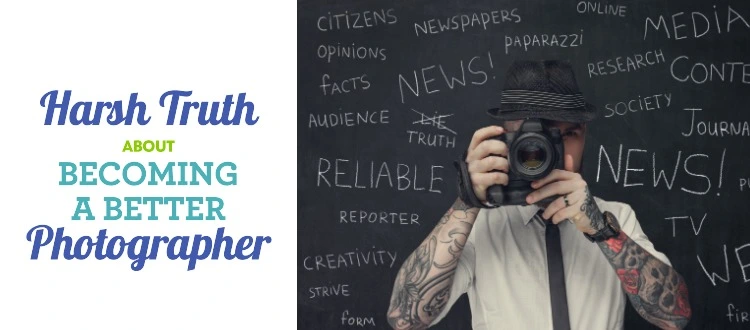Theodore Lowe, Ap #867-859
Sit Rd, Azusa New York
Find us here
The Harsh Truth About Becoming a Better Photographer

It’s about commitment, creativity, and sometimes, a lot of frustration. You might think you can breeze through it with a few online tutorials, but there’s so much more beneath the surface. Are you prepared to face the challenges that can transform your snapshots into art?
Stick around, because what you’ll learn here could change the way you capture the world forever.
Facing Criticism
Facing criticism is an unavoidable part of growing as a photographer. It can feel daunting but it holds immense value. Criticism helps you see your work from a fresh perspective. It's a tool for improvement, even if it stings at first. Accepting feedback requires courage and humility.
Embracing Feedback
Embracing feedback is crucial for artistic growth. It opens your eyes to different viewpoints. Constructive criticism can guide you in refining your skills. Learn to listen actively. Take notes on areas needing improvement. This helps you adjust your techniques effectively. Feedback from peers and mentors can be enriching. It gives you a roadmap for becoming better.
Learning From Mistakes
Learning from mistakes is a vital part of the journey. Mistakes teach us valuable lessons. They highlight areas needing attention. Analyze your errors thoroughly. Understand what went wrong. This self-reflection is key to improvement. Every mistake offers a chance to learn. It propels you forward in your craft. Mistakes are not failures, they are lessons. They shape your path to becoming a skilled photographer.
Investing Time
Becoming a better photographer requires more than just a good camera. The secret lies in investing time. This investment goes beyond snapping pictures. It involves constant practice, learning, and patience. Many budding photographers overlook this crucial step. They expect instant results. But, like any skill, photography demands dedication. Time is your greatest ally in mastering this art.
Practice And Patience
Practice makes perfect. This saying holds true in photography. Regular practice helps you understand your camera. It allows you to learn its settings and functions. Try different angles and lighting. Experiment with composition. Each photo teaches you something new. Mistakes are part of learning. Don't rush the process. Patience is key. Great photographers spend years refining their skills.
Continuous Learning
Photography is ever-evolving. New techniques and technologies emerge regularly. Stay updated with the latest trends. Read photography books and articles. Watch tutorials online. Attend workshops and seminars. Engage with other photographers. Learn from their experiences. Seek feedback on your work. Each learning experience adds to your skillset. Remember, a great photographer is always a student.
Understanding Equipment
Understanding equipment is crucial to your journey as a photographer. You might think that upgrading your camera will instantly improve your skills. Yet, the reality is that mastering your gear requires patience and dedication. It's a journey filled with trial, error, and some unexpected revelations.
Mastering The Basics
Before you rush to buy the latest camera model, ask yourself: have you truly mastered the basics of your current equipment? Knowing how to adjust settings like ISO, aperture, and shutter speed can drastically change your images. Many photographers overlook these foundational elements in pursuit of better gear.
Consider my early days of photography. I thought a new camera would solve my blurry image problem. But it was only when I learned to tweak my existing camera settings that my photos improved. Sometimes, it's not about what you have, but how well you use it.
Have you explored all the features your camera already offers? Hidden gems like manual focus, burst mode, or even built-in filters can elevate your photography. Mastering these can save you money and help you capture stunning shots.
Exploring Advanced Gear
Once you're confident in the basics, exploring advanced gear becomes exciting. Think of lenses, tripods, and lighting equipment as extensions of your creativity. These tools allow you to push boundaries and experiment with new techniques.
But don't be overwhelmed by the plethora of options. Focus on what complements your style. When I decided to invest in a wide-angle lens, it opened up new perspectives in landscape photography. What kind of gear can transform your current limitations into strengths?
Advanced gear can enhance your capabilities but remember, it's not a magic wand. Investing in it means committing to learning and practice. Are you ready to dedicate time to understand your new tools thoroughly?
Ultimately, the harsh truth is that better equipment won't make you a better photographer overnight. It's the understanding and mastering of these tools that empower your artistic vision. So, what are you willing to learn today to improve your skills?
Developing A Unique Style
Developing a unique style in photography is a personal journey. It involves exploring various aspects of your creativity. Many photographers start by imitating others. This can be a useful learning step. But, to stand out, you need your own voice. A unique style reflects your vision and experiences. It's what makes your work recognizable and memorable. Let's explore how you can cultivate this uniqueness.
Experimenting With Techniques
Experimentation is key to discovering your style. Try different techniques to see what resonates. Play with light, angles, and composition. Change your perspective and explore new subjects. Each experiment teaches you something new. Embrace mistakes as part of the process. They often lead to unexpected discoveries. Challenge yourself to step outside your comfort zone. Growth happens there.
Finding Your Voice
Your voice in photography is your personal narrative. It's the way you see and interpret the world. To find it, reflect on what inspires you. Consider the emotions you want to convey. Consistency in your choices helps define your voice. Analyze your favorite photos and identify common themes. Over time, your unique style will emerge. It's a reflection of your artistic journey.
Networking Challenges
Networking is essential for photographers who want to grow. It presents unique challenges that can be tough to navigate. Many photographers struggle to make connections. The competition is fierce. Understanding these challenges can help you build a solid network.
Building Connections
Start by attending photography workshops and events. These gatherings are great for meeting peers and industry leaders. Conversations at these events can lead to valuable friendships. Join online photography forums. Share your work and engage with other members. Offering constructive feedback helps build trust and rapport. Remember, genuine connections take time and effort.
Navigating Competitive Environments
The photography world is highly competitive. Many photographers vie for attention and opportunities. Standing out requires more than just skill. Show your unique style and perspective. Be open to collaboration. Working with others can enhance your learning and exposure. Stay informed about industry trends and adapt your style. The ability to evolve can set you apart in a crowded field.
Balancing Art And Business
Becoming a better photographer isn't just about capturing stunning images; it's also about striking a balance between the creative and business sides of the profession. Many photographers find themselves overwhelmed by the challenge of wearing multiple hats—being both an artist and an entrepreneur. While mastering your craft is essential, understanding the nitty-gritty of business can make or break your success. If you can navigate the complexities of marketing and managing finances, you'll have a better shot at thriving in the competitive world of photography.
Marketing Your Work
Marketing is crucial for photographers who want to reach a wider audience. It's not just about showcasing your best shots; it's about telling a compelling story that resonates with potential clients.
Consider leveraging social media platforms like Instagram and Facebook to share your journey. Create engaging posts that highlight your unique style and behind-the-scenes moments.
Building a website is another effective way to market your work. It acts as your digital portfolio, allowing clients to easily browse through your projects and understand your capabilities.
Networking can open doors you never knew existed. Attend photography workshops, join online forums, and connect with other professionals in your field.
Have you considered offering limited-time promotions or discounts? These can attract new clients and help you build a loyal customer base.
Managing Finances
Managing finances can be daunting, but it's essential for sustaining your photography business. Keeping track of expenses and income ensures you know where your money is going and coming from.
Separate your personal and business finances. Open a dedicated business account to avoid confusion and keep things organized.
Investing in accounting software can save you time and reduce errors. It provides a clear overview of your financial health and helps you plan for future expenses.
Set a budget for equipment upgrades. While new gear can enhance your work, it’s vital to purchase only what you need and can afford.
Think about insurance. Protecting your equipment and your business from unforeseen circumstances can save you from potential financial pitfalls.
Balancing art and business is no easy feat. Are you ready to take the plunge and tackle both aspects head-on? Making informed decisions in marketing and managing finances can propel your photography career to new heights.
Handling Rejection
Handling rejection is a crucial part of becoming a better photographer. Rejection can sting, but it also shapes growth. A photo turned down is not the end. It's a stepping stone in your journey. Learning to handle rejection is essential. It helps you refine your skills and focus your vision.
Building Resilience
Resilience helps you bounce back from rejection. It is the ability to stand tall despite setbacks. Every rejection is a lesson. It teaches what works and what does not. Over time, resilience builds confidence. It encourages you to keep trying, honing your craft with each attempt.
Turning Setbacks Into Opportunities
Setbacks often hide opportunities. A rejected photo might lead to unexpected insights. It pushes you to explore different angles or techniques. A new perspective can emerge from a failure. It might inspire a creative approach or a fresh idea. Embrace setbacks as a chance to learn and grow.
Conclusion
Becoming a better photographer takes time and effort. Every shot teaches you something new. Practice consistently to improve your skills. Understand that not every photo will be perfect. Mistakes are part of learning. Keep exploring different techniques and styles. Stay patient and persistent on your journey.
Remember, photography is an art. Enjoy the process and let your creativity flow. Challenge yourself with new subjects and settings. Over time, your skills will grow. Capture moments that matter to you. Keep shooting and learning. Your passion will shine through in your work.
Related blog posts
QR Codes in Photography: Unlocking Creative Possibilities
Imagine transforming your photography into an interactive experience that captivates your audience. QR codes are revolutionizing the way we share and engage with images.


